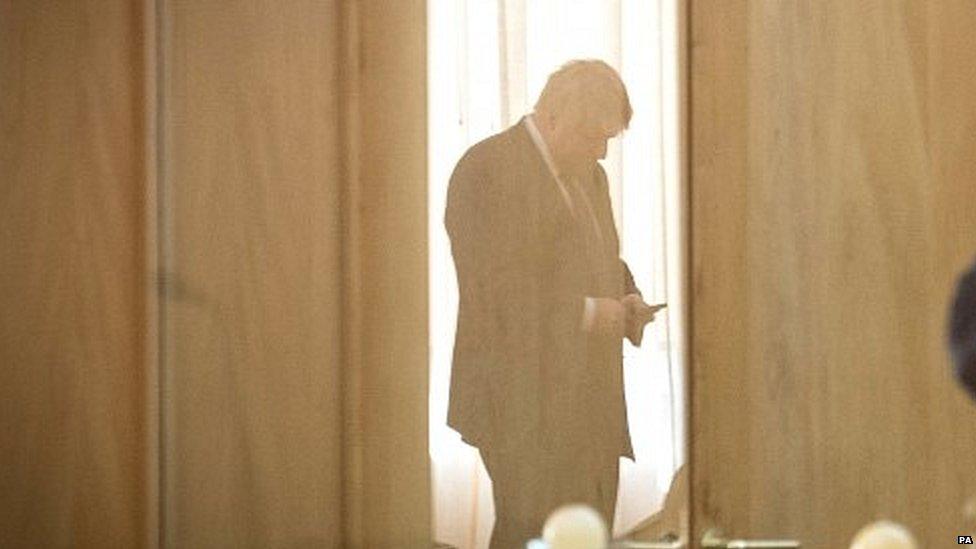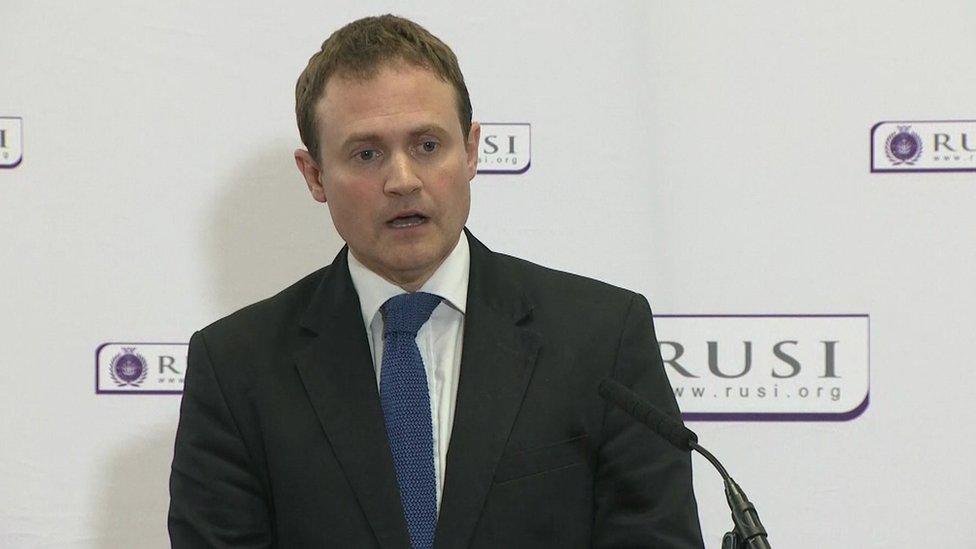Boost foreign secretary's powers, says Tom Tugendhat
- Published
- comments

Boris Johnson has insisted the UK will become a more "outward-looking" country after Brexit
The Foreign Office needs "more authority" if the UK is to maximise its international influence after Brexit, Conservative MP Tom Tugendhat has said.
The department should regain "strategic control" over trade, defence, aid and intelligence as well as diplomacy, Mr Tugendhat - who is chair of the Commons Foreign Affairs Committee - argued.
Boris Johnson and his predecessors had found themselves "hobbled", he said.
Ministers say a "Global Britain" will maintain its clout on the world stage.
They point to the UK's membership of Nato and the UN Security Council, its historic relationships with the United States and the Commonwealth, and the use of soft power to advance the UK's values and interests.
Although Mr Johnson remains a vocal advocate for Brexit, the process is being handled by other departments rather than the Foreign Office, leading to suggestions he has been marginalised.
While No 10 has overall responsibility, the day-to-day negotiations are being led by the Department for Exiting the European Union and the Department for International Trade is responsible for paving the way for trade agreements after the UK leaves in March 2019.
Meanwhile, the UK's £13bn overseas aid budget is controlled by the Department for International Development while the intelligence agencies report to No 10, via the Cabinet Office.

The MP chairs the Commons foreign affairs committee
In a speech in London, the MP said the Foreign Office was no longer the "strategic engine" of foreign policy making, having "lost control" of key functions such as trade and development and finding itself in a constant "tug-of-war" on national security with the Cabinet Office.
"Successive foreign secretaries - including the current one - have been hobbled," he told the Royal United Services Institute. "They have had the title but they have not had the power".
He said he was not calling for the international trade, aid and defence departments to be axed as there was real technical skill involved in managing multibillion-pound programmes but he believed the Foreign Office should have "strategic oversight" over their delivery.
Following Brexit, he said there was a real opportunity for the UK to work with like-minded countries such as Japan and Germany to advance shared interests such as free trade and the rule of law as part of a natural "evolution" of the post-1945 political and security order.
'Nothing personal'
The ex-army officer told the BBC he had "nothing personal" against Mr Johnson, who he said was "talented", but there was a clear need for someone to set a "total foreign policy" in the run-up to Brexit and afterwards.
"Even he has not been able to use all the levers that some of his predecessors had because he simply does not have them," Mr Tugendhat told BBC Radio 4's Today programme.
"The reality is that Brexit isn't just about Europe. Brexit is about Britain's place in the world and this is why the foreign policy of the UK needs to be broader than just the British policy about Europe, or the British policy about trade or defence, or indeed aid."
"All of these things play into our Brexit deal: how we look after people in North Africa affects migrant flows into Italy, how we do defence deals with the United States affects trade with France and Germany, how we do defence engagement in the Middle East affects directly energy prices and therefore the interests of European consumers."
Mr Johnson has rejected suggestions the Foreign Office's influence has shrunk, insisting the UK has one of the largest "diplomatic footprints" in the world.
In March, he announced the creation of 250 new diplomatic posts - including 10 new sovereign missions - as part of a 15% increase in the size of the UK's overseas network.
This is being funded by money set aside for Brexit preparations and for the government's Global Britain strategy, which Mr Johnson has defined as the UK being more "outward-looking and more engaged with the world than ever before".